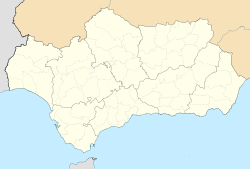| Granada Mosque | |
|---|---|
Spanish: Mezquita de Granada | |
 The mosque in 2016 | |
| Religion | |
| Affiliation | Sunni Islam |
| Ecclesiastical or organisational status | Mosque |
| Status | Active |
| Location | |
| Location | Granada, Andalusia |
| Country | Spain |
Location of the mosque in Andalusia | |
| Geographic coordinates | 37°10′53.1″N3°35′31.2″W / 37.181417°N 3.592000°W |
| Architecture | |
| Type | Mosque architecture |
| Date established | c. 1980s(as a community) |
| Groundbreaking | c. 1997 |
| Completed | 2003 |
| Website | |
| mezquitadegranada | |
The Granada Mosque (Spanish : Mezquita de Granada) is a Sunni Islam mosque, located adjacent to the Plaza San Nicholas in the Albaicin district of Granada, Spain. Opened in 2003, it is the first mosque built in the city since 1492, when the conquest of Granada by Queen Isabella I of Castile and King Ferdinand II of Aragon concluded the reconquest of Spain by the Catholic Monarchs. Funded mainly by overseas donations and local support, the mosque was opened in 2003.
